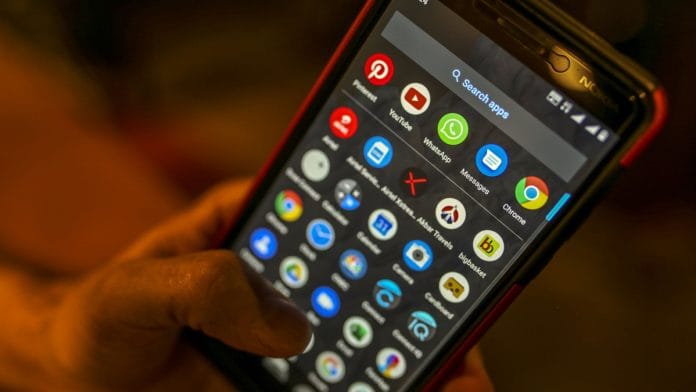New Delhi: Nearly a month after India banned 59 Chinese apps over national security and privacy concerns, 23 of them are still functioning, either through the main app or on ‘lite’ version.
While none of the apps are available on the Google Play Store for Android phones, clones or lite versions of them are available in some cases, while others are available through their websites.
Among those still functioning are SHAREit (lite version), Baidu Maps, Clash of Kings, DU Battery Saver, Virus Cleaner, APUS Browser, BeautyPlus, Xender, QQ Music, SelfieCity, Parallel Space (lite version), ES File Explorer, VivaVideo (lite version), DU Recorder, DU Cleaner, CamScanner, CleanMaster-Cheetah, Wonder Camera, Photo Wonder, Sweet Selfie, Baidu Translate, QQ Launcher and DU Privacy.
Just last week, the government extended the ban to include 47 alternative versions of the 59 banned apps. An official source in the IT ministry Monday confirmed that the new set of apps were banned with effect from Friday. “… These are variants/clones of 59 already banned apps,” said the source.
When contacted by ThePrint on 24 July, Press Information Bureau Director General K.S. Dhatwalia had refused to comment on the Chinese apps still in use.
Also read: Hyderabad, Chennai, Delhi among world’s top 50 most surveilled cities, says report
Govt officials, BJP still using banned apps
Another official in the IT ministry told ThePrint that the government banned alternative versions of the 59 apps after it came to light that some of the apps were still available in the country. Several of the apps that were functioning until then no longer do. These include video streaming apps Bigo (lite version), video status creating apps UVideo and VFly-Status Video, and messaging app WeChat.
The Bharatiya Janata Party (BJP) was found using CamScanner on 27 July. The Aam Aadmi Party noticed a tweet put out by the party which included a document that had a CamScanner message on it.
BJP spokesperson Suresh Nakhua, however, denied the claim, though a tweet by a journalist posting the same document also showed it had been scanned using the app.
And Aam Aadmi Party caught photoshopping to malign BJP.
Original https://t.co/MQXT7kaRoF
Photoshopped https://t.co/iY5ADC1H2y https://t.co/brcieCXtfc pic.twitter.com/R1pYdbuWjS
— Suresh Nakhua ?? ( सुरेश नाखुआ ) (@SureshNakhua) July 27, 2020
A Delhi district court document dated 20 July was scanned using CamScanner and is available on delhicourts.nic.in.
The second IT ministry official quoted above had earlier, on 22 July, told ThePrint that the alternative versions of banned apps, such as the ‘lite’ versions, would be investigated. The official added that the 59 apps were not the final list and that more apps could be banned in the future.
Also read: PM Modi quits Chinese social media app Weibo, has deleted all 115 posts
The ‘lite’ argument
A ‘lite’ version of an app still provides the main functionality, but will likely not support the full set of features the app has. For example, the lite version of SHAREit doesn’t allow sending data to your own devices. Such banned apps with a lite version include SHAREit, VivaVideo, Likee, Bigo Live, Parallel Space and Sweet Selfie.
While Google Play Store has removed a majority of the apps and their alternative avatars, at least 40 of the banned apps were available for download on third party sites like softonic.com or uptodown.com in the form of an APK file.
APK stands for Android Package. An APK file will contain all the required code to run the app on your phone. The APK may also not contain the latest or most updated version of the app. Further, downloading these files from relatively unknown sites will mean they can’t be trusted like the app store.
Not all apps when downloaded as an APK file function, such as TikTok, but a majority of them are working.
Also read: TikTok distanced itself from China in letter to Modi govt before India banned it: Report
The APK problem
So, why is it that some APK files work and others don’t?
One possible reason is that those that work probably do not need to communicate with a server via the internet and can simply operate on the phone itself.
Aseem Jakhar, co-founder of cybersecurity firm Payatu, said, “For an app like TikTok that allows posting and viewing videos, the app on a user’s phone needs to communicate with the app company’s cloud/servers on the Internet. However, if access to the server or cloud is blocked by the internet service provider or the app company themselves then, (you) cannot access its services (even if you have the app).”
However, Jakhar added, apps that perform functions like selfie-editing or saving space on your phone “can perform as normal since these functions occur locally on your phone and don’t need to communicate with a server on the Internet”.
The popular apps and sites that have been banned have put up notices on their platforms.
TikTok and Helo, both owned by ByteDance, were among the few apps that didn’t work even when it was downloaded from a lesser known site as an APK file. When you launch the apps, it notifies you about the government ban.
Xiaomi also prompts the message on Mi Community page, also banned, when one tries to access it.
Shein had a notice on its India site that read: “…we decided to temporarily pause new orders from India starting from 11th of July, until we can reach a new agreement with the government and the ban order is lifted.”
Romwe had a similarly worded notice on its site, which said new orders had been halted, from 7 July.
Also read: Everyone’s talking about TikTok but ‘100 million’ Indian smartphone users are missing this app






